Published Jul 12th, 2023, 7/12/23 4:43 pm
- 1,304 views, 2 today
- 257 downloads, 0 today
193
Napoleon I Bonaparte
French statesman and brilliant commander, diplomat, Emperor of the French (1804–1814). He took part in the French Revolution, as a result of which he came to power.

The biography of Napoleon Bonaparte is the life path of an outstanding personality with a phenomenal memory, undoubted intelligence, extraordinary abilities and extraordinary performance.
Napoleon Bonaparte was born in Corsica in the city of Ajaccio. This event in the family of Carlo and Letizia di Buonaparte took place on August 15, 1769. Buonaparte belonged to a poor noble family. In total, the parents of the future conqueror of Europe had eight children.
His father was a lawyer, and his mother devoted her life to the birth and upbringing of children. It is interesting to note that the surname of a famous Corsican family, later the ruling dynasty of France, was pronounced Buonaparte in Italian, and Bonaparte in French.
Educated at home, at the age of six Napoleon went to study at a private school, and at the age of ten he was transferred to Autun College. After some time, a capable young man moved to the small French city of Brienne and continued his studies there at a military school.
In 1784 he passed the exams at the Paris Military Academy, after which he received the rank of lieutenant and went to serve in the artillery. In addition to his passion for military affairs, Napoleon read and wrote a lot of fiction. The writings of the future emperor are almost all kept in manuscripts. Little is known about their content.

The Great French Revolution, which resulted in the destruction of the absolute monarchy and the proclamation of the First French Republic, Napoleon met enthusiastically.
In 1792, he joined the most influential political movement in France at that time, the Jacobin Club. Subsequently, the club was reborn as a government body, and many of its members became prominent politicians. Napoleon was no exception.
Starting in 1793, his military career rapidly went uphill: he received the rank of brigadier general, took an active part in suppressing the uprisings of supporters of the monarchy, became the commander-in-chief of the army, and after the success of the Italian company, he became a recognized commander. A brief biography of Napoleon Bonaparte is replete with both brilliant and tragic moments.

On November 9, 1799, a coup d'etat took place in France, the result of which was the fall of the Directory and the creation of a new government headed by the consul, and then the emperor Napoleon Bonaparte. This was a turning point in his biography. His reign was marked by the adoption of a number of successful reforms in the administrative and legal sphere, victorious military campaigns, as a result of which he subjugated almost all of Europe.

The Patriotic War of 1812 is a war between the French and Russian empires, which took place on the territory of Russia. Despite the superiority of the French army, under the leadership of Napoleon Bonaparte, the Russian troops managed to show incredible valor and ingenuity.
Moreover, the Russians managed to emerge victorious in this difficult confrontation. Until now, the victory over the French is considered one of the most significant in the history of Russia.
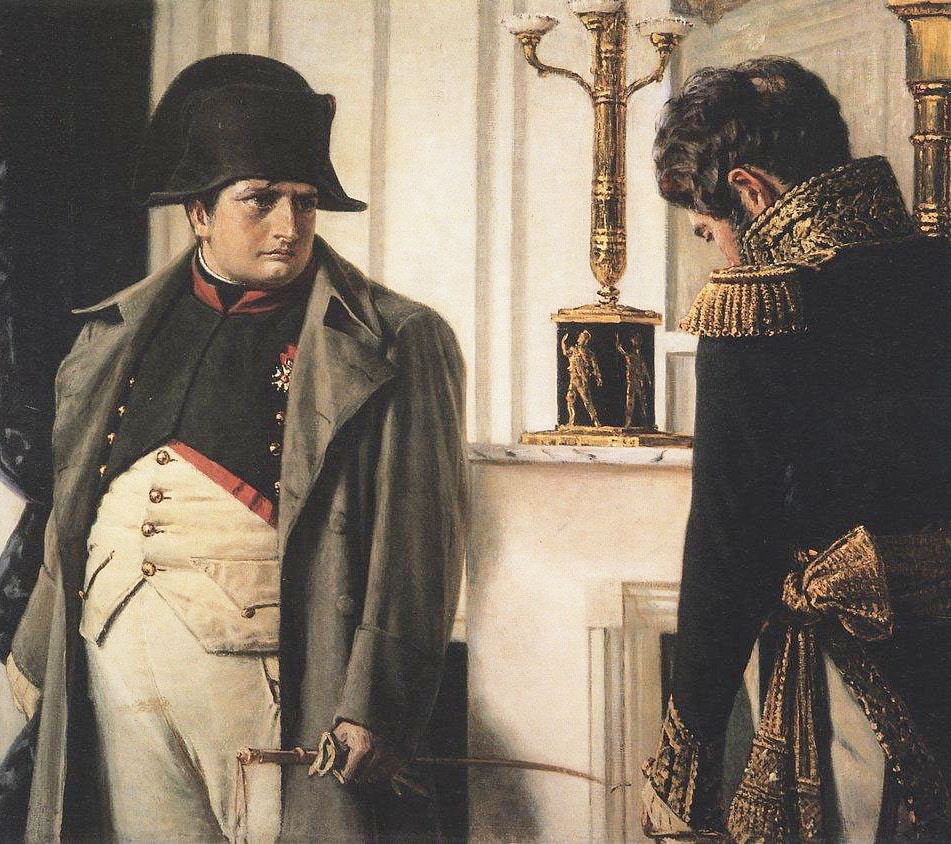
On June 12, 1812, the Napoleonic army crossed the Neman, after which it entered Russia. The 1st and 2nd Russian armies came out to meet them, deliberately not engaging in open battle with the enemy.
They fought rearguard battles, the purpose of which was to wear down the enemy and inflict significant losses on him.
Alexander I ordered that his troops avoid disunity and prevent the enemy from breaking them into separate parts. Ultimately, thanks to well-planned tactics, they managed to achieve this. Thus, Napoleon's first plan remained unrealized.
On August 8, Mikhail Kutuzov was appointed Commander-in-Chief of the Russian Army. He also continued the tactics of a general retreat.
And although the Russians retreated purposefully, they, like the whole people, were waiting for the main battle, which sooner or later had to take place anyway.
Soon this battle will take place near the village of Borodino, located not far from Moscow.
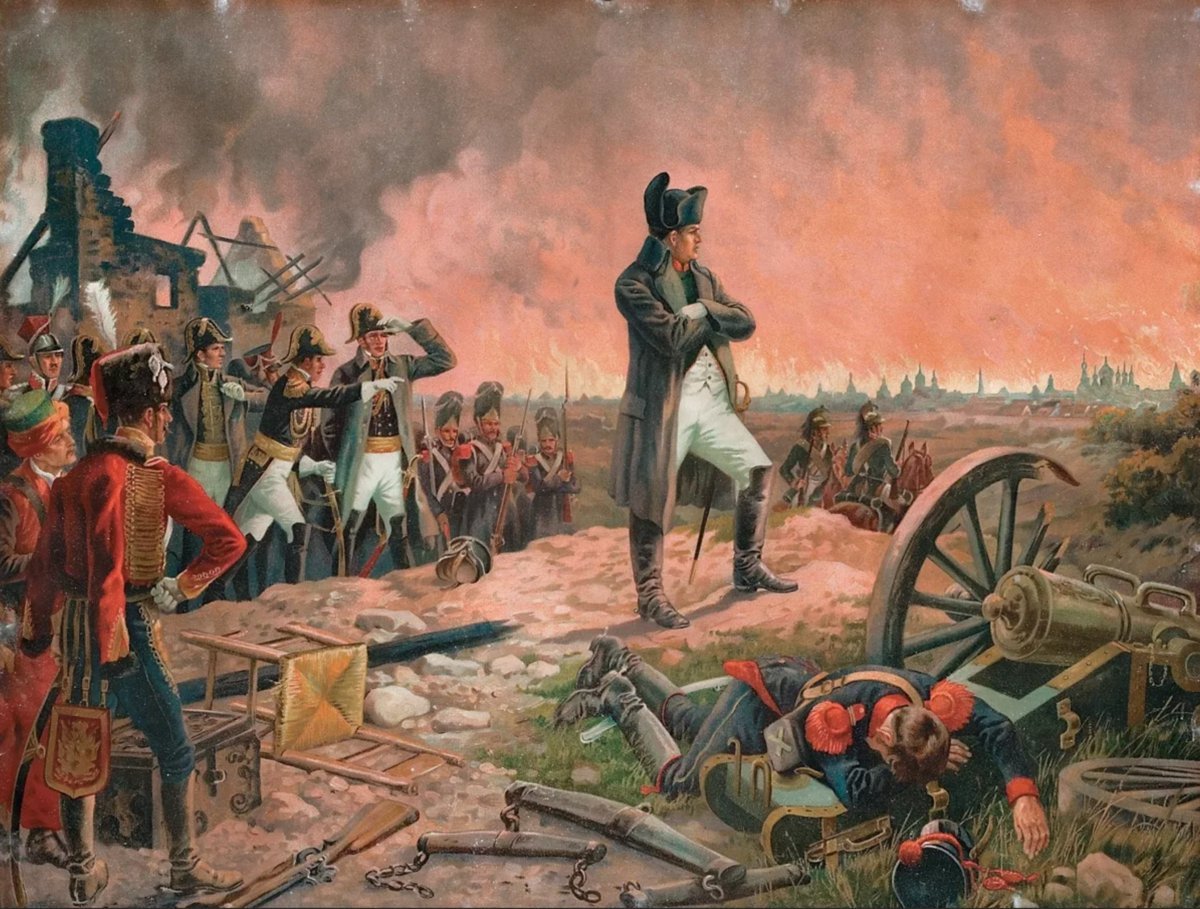
At the height of the Patriotic War of 1812, Kutuzov chose defensive tactics. Bagration commanded the troops on the left flank, Raevsky's artillery was in the center, and Barclay de Tolly's army was on the right flank.
Napoleon, on the other hand, preferred to attack rather than defend, since this tactic repeatedly helped him emerge victorious from military campaigns.
He understood that sooner or later the Russians would stop their retreat and they would have to accept the battle. At that time, the French emperor was sure of his victory, and, I must say, there were good reasons for that.
Until 1812, he had already managed to show the whole world the power of the French army, which was able to conquer more than one European country. The talent of Napoleon himself, as an outstanding commander, was recognized by all.
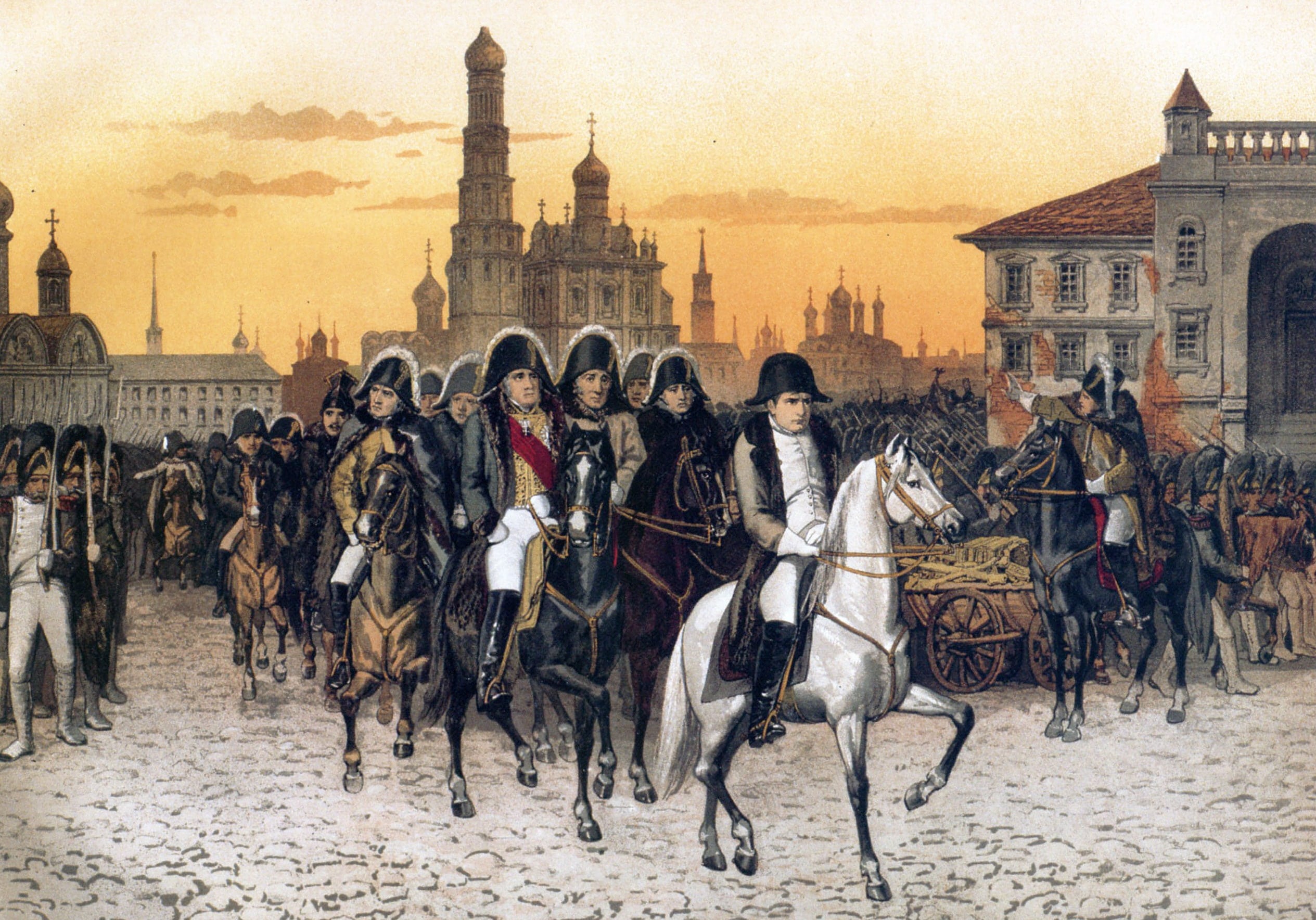
The Battle of Borodino took place on August 26 (September 7), 1812 near the village of Borodino, 125 km west of Moscow.
Ultimately, the Russians retreated in an organized manner, but this did nothing for Napoleon.
Then the French began to attack the center of the Russian troops. In this regard, Kutuzov ordered the Cossacks to bypass the enemy from the rear and strike at him.
Despite the fact that the plan did not bring any benefit to the Russians, it forced Napoleon to stop the attack for several hours. Thanks to this, Kutuzov managed to pull additional forces to the center.
Ultimately, Napoleon still managed to take the Russian fortifications, however, as before, this did not bring him any significant benefit. Due to constant attacks, he lost many soldiers, so the fighting soon began to subside.
Both sides lost a large number of men and guns. However, the Battle of Borodino lifted the morale of the Russians, who realized that they could fight with great success against Napoleon's great army. The French, on the contrary, were demoralized, dejected by the failure and were completely at a loss.

The Patriotic War of 1812 continued. After the battle of Borodino, the army of Alexander 1 continued its retreat, getting closer and closer to Moscow.
The French followed, but no longer sought to engage in open battle. On September 1, at the military council of Russian generals, Mikhail Kutuzov made a sensational decision, with which many did not agree.
He insisted that Moscow be abandoned, and all property in it destroyed. As a result, this is what happened.
On September 14, Napoleon occupied Moscow without a fight.
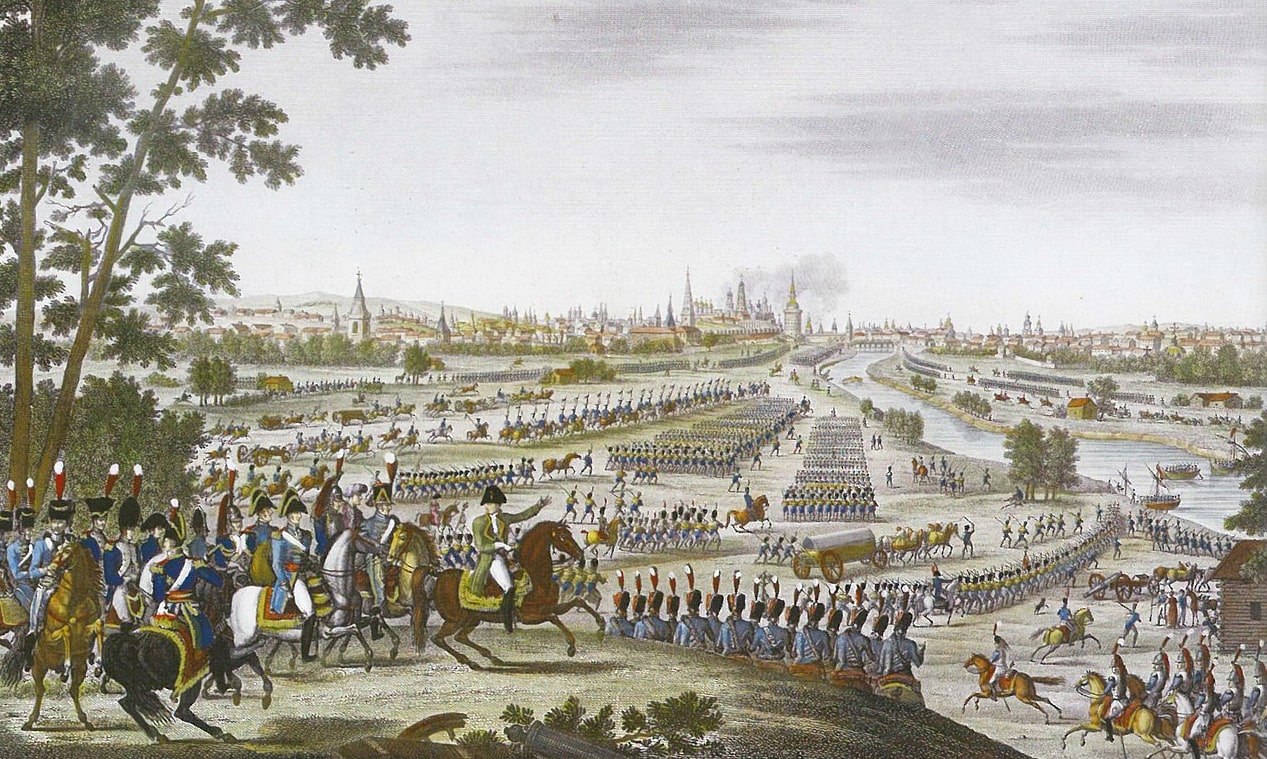
The French army, exhausted physically and mentally, needed to replenish food supplies and rest. However, they were bitterly disappointed.
Once in Moscow, Napoleon did not see a single inhabitant or even an animal. Leaving Moscow, the Russians set fire to all the buildings so that the enemy could not use anything. It was an unprecedented event in history.
When the French realized the deplorability of their stupid situation, they were completely demoralized and defeated. Many soldiers ceased to obey the commanders and turned into gangs of robbers who ran around the outskirts of the city.
Russian troops, on the contrary, were able to break away from Napoleon and enter the Kaluga and Tula provinces. There they had food supplies and ammunition hidden. In addition, the soldiers could take a break from a difficult campaign and replenish the ranks of the army.
The best solution to this ridiculous situation for Napoleon was the conclusion of peace with Russia, but all his proposals for a truce were rejected by Alexander I and Kutuzov.
A month later, the French began to leave Moscow in disgrace. Bonaparte was furious at this outcome of events and did everything possible to join the battle with the Russians.
Having reached Kaluga on October 12, near the city of Maloyaroslavets, a major battle took place, in which both sides lost many people and military equipment. However, the final victory did not go to anyone.

The further retreat of the Napoleonic army was more like a chaotic flight than an organized exit from Russia. After the French began to loot, the locals began to unite in partisan detachments and engage in battles with the enemy.
At this time, Kutuzov cautiously pursued Bonaparte's army, avoiding open clashes with it. He wisely took care of his warriors, well aware that the enemy's forces were fading before his eyes.
The French suffered serious losses in the battle near the city of Krasny. Tens of thousands of invaders died in this battle. The Patriotic War of 1812 was coming to an end.
When Napoleon tried to save the remnants of the army and ferry them across the Berezina River, he once again suffered a heavy defeat from the Russians. At the same time, it should be understood that the French were not ready for the unusually severe frosts that struck at the very beginning of winter.
Obviously, before the attack on Russia, Napoleon did not plan to stay in it for so long, as a result of which he did not take care of warm uniforms for his troops.
As a result of the inglorious retreat, Napoleon abandoned the soldiers to their fate and secretly fled to France.
On December 25, 1812, Alexander I issued a manifesto, which spoke of the end of the Patriotic War.
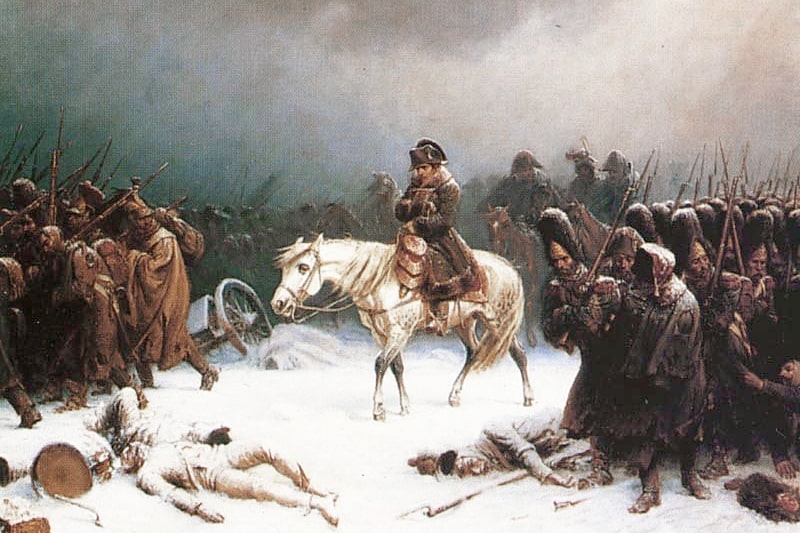
As a result, the allied troops brought Napoleon to France and Bonaparte had to defend himself on the territory of his Empire
On March 30-31, 1814, Paris was stormed, after which the Emperor had to sign a surrender and leave his throne.
Napoleon was exiled to the island of Elba, he took with him part of his old guard. Bonaparte did not like his own position, as he still felt like the Emperor of the French.
Napoleon, taking his guard with him, sailed back to France. He walked through the lands of his Empire and all the joys that could stop him were transferred to his side.
As a result, Napoleon again became the Emperor of the French and decided to take revenge.
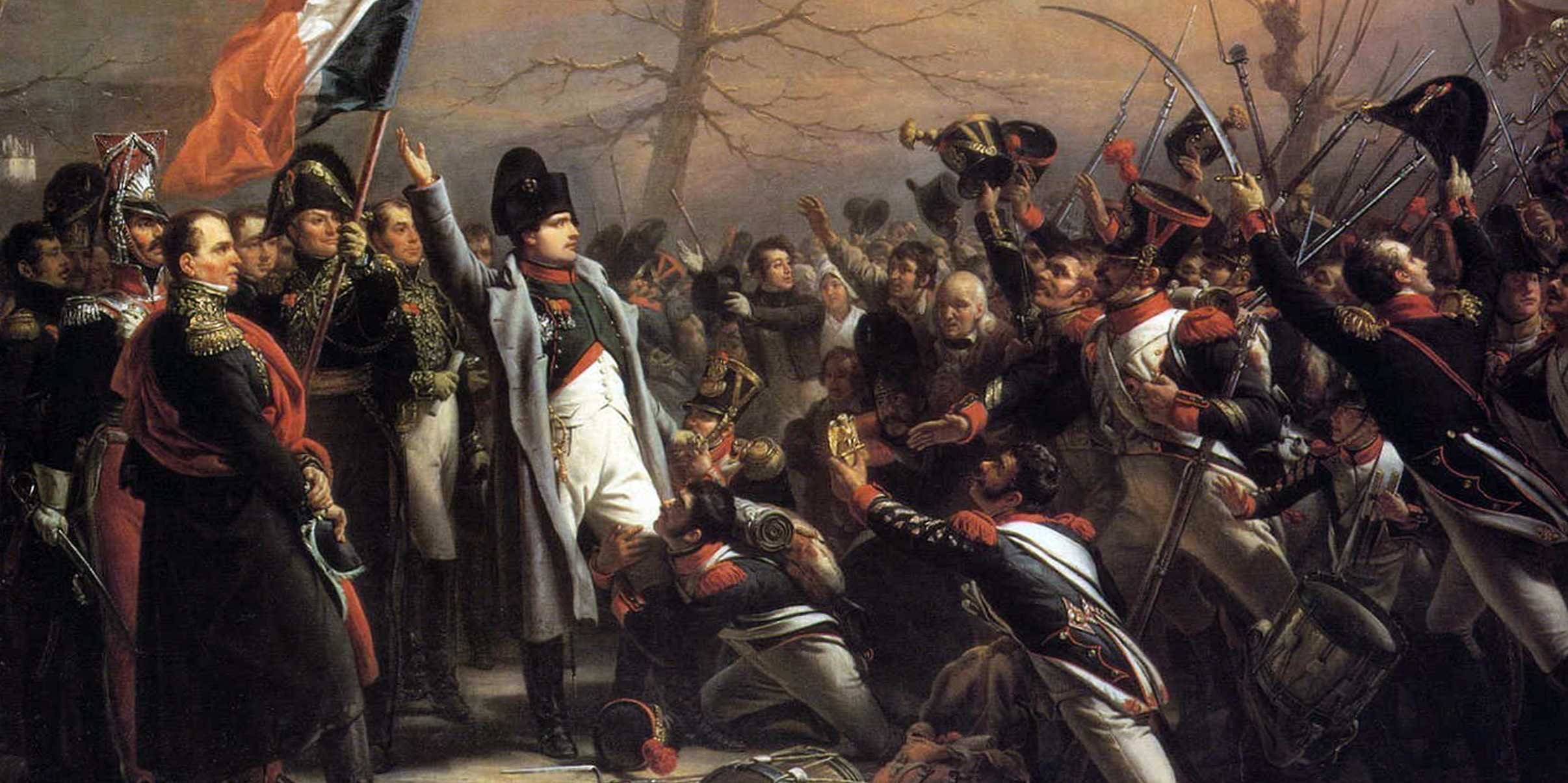
By the beginning of the summer of 1815, there were about 200 thousand people in the Napoleonic army, but the level of training of the soldiers was low, and he used only half for the war.
The Seventh Coalition fielded 700,000 soldiers against Napoleon. The Emperor of France understood that he had only one way to achieve victory - to break the coalition troops piecemeal.
In a short period of time, he was able to advance into the territory of modern Belgium, which did not yet exist as a separate state, and on June 16, 1815, win the battle of Ligny over the army of the Prussian commander Blucher. On the map, the place of the battle should be looked for a little south of Brussels.
On June 16, 1815, the Battle of Quatre Bras took place between the French Marshal Ney and the Anglo-Dutch army of Wellington and Prince Willem. The outcome of the battle was uncertain. After him, Napoleon headed towards Brussels, and Marshal Grouchy sent to pursue the Prussian army of Blucher.

The Battle of Waterloo began at 11:30 am and continued until 8 pm. The first episode of the battle was a distraction attack by the French army on the Hougoumont farm. It turned into a fierce battle that lasted until the evening.
The first attack by the French infantry brought temporary success, it managed to overturn Van Bylandt's Dutch division, which had lost almost all of its officers. The next episode was the attack of the British and Scottish heavy cavalry on the orders of the Earl of Uxbridge. Against them, Napoleon threw the brigades of his heavy cavalry - cuirassiers.
In these clashes, the French army lost valuable time, as the Prussian army approached the battlefield. Despite the desertion of the Hanoverian regiment and the Dutch cavalry brigade from the Wellington ranks, Napoleon's army could not cope with it.
All day long, the Prussian troops of Blucher and Bülow were moving towards the battlefield. During the movement, they managed to engage in battle with the foot soldiers commanded by Marshal Georges Mouton, and the latter failed. Marshal Grouchy, following the orders of Napoleon, entered the battle near the town of Wavre with the Prussian army of Johann von Tillmann. Despite a tactical victory and a double numerical superiority, the strategic victory at the Battle of Wavre remained with Prussia.
The last French attack took place on the evening of June 18 - Napoleon sent the Imperial Guard into battle. According to his idea, this attack was supposed to push back Wellington's troops and prevent him from connecting with the Prussian army of Blucher. At this point in the battle, the emperor of France personally led the guards into battle, he went ahead of the column. The guards managed to defeat one of the German battalions, but by the evening they were defeated by the British.

In short, the result of the Battle of Waterloo was the defeat of the French army, the loss of all guns and baggage. She lost about 33 thousand soldiers killed, wounded and captured, which is about 30% more than her opponents. Napoleon fled to Paris and then asked for political asylum from the British, who exiled him to Saint Helena, where he died in 1821.
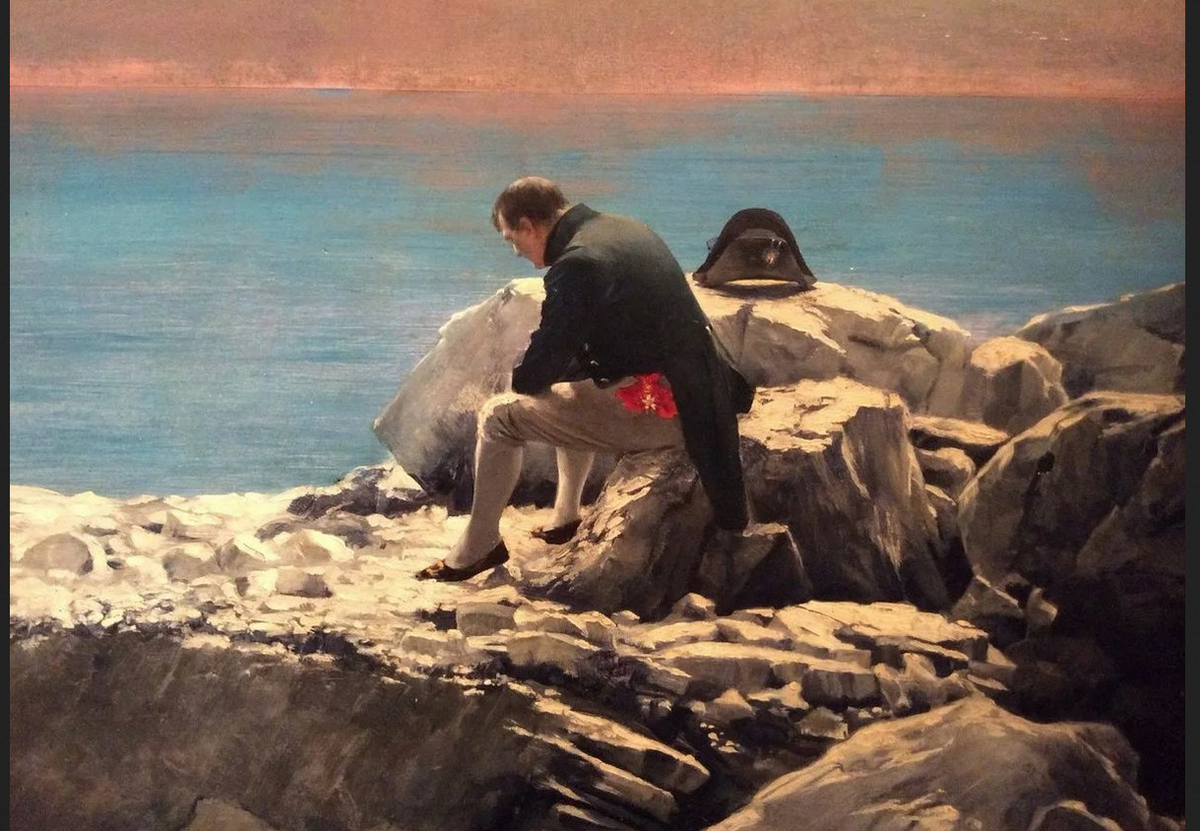
"Every soldier carries a marshal's baton in his satchel."
French statesman and brilliant commander, diplomat, Emperor of the French (1804–1814). He took part in the French Revolution, as a result of which he came to power.

The biography of Napoleon Bonaparte is the life path of an outstanding personality with a phenomenal memory, undoubted intelligence, extraordinary abilities and extraordinary performance.
Napoleon Bonaparte was born in Corsica in the city of Ajaccio. This event in the family of Carlo and Letizia di Buonaparte took place on August 15, 1769. Buonaparte belonged to a poor noble family. In total, the parents of the future conqueror of Europe had eight children.
His father was a lawyer, and his mother devoted her life to the birth and upbringing of children. It is interesting to note that the surname of a famous Corsican family, later the ruling dynasty of France, was pronounced Buonaparte in Italian, and Bonaparte in French.
Educated at home, at the age of six Napoleon went to study at a private school, and at the age of ten he was transferred to Autun College. After some time, a capable young man moved to the small French city of Brienne and continued his studies there at a military school.
In 1784 he passed the exams at the Paris Military Academy, after which he received the rank of lieutenant and went to serve in the artillery. In addition to his passion for military affairs, Napoleon read and wrote a lot of fiction. The writings of the future emperor are almost all kept in manuscripts. Little is known about their content.

The Great French Revolution, which resulted in the destruction of the absolute monarchy and the proclamation of the First French Republic, Napoleon met enthusiastically.
In 1792, he joined the most influential political movement in France at that time, the Jacobin Club. Subsequently, the club was reborn as a government body, and many of its members became prominent politicians. Napoleon was no exception.
Starting in 1793, his military career rapidly went uphill: he received the rank of brigadier general, took an active part in suppressing the uprisings of supporters of the monarchy, became the commander-in-chief of the army, and after the success of the Italian company, he became a recognized commander. A brief biography of Napoleon Bonaparte is replete with both brilliant and tragic moments.

On November 9, 1799, a coup d'etat took place in France, the result of which was the fall of the Directory and the creation of a new government headed by the consul, and then the emperor Napoleon Bonaparte. This was a turning point in his biography. His reign was marked by the adoption of a number of successful reforms in the administrative and legal sphere, victorious military campaigns, as a result of which he subjugated almost all of Europe.

The Patriotic War of 1812 is a war between the French and Russian empires, which took place on the territory of Russia. Despite the superiority of the French army, under the leadership of Napoleon Bonaparte, the Russian troops managed to show incredible valor and ingenuity.
Moreover, the Russians managed to emerge victorious in this difficult confrontation. Until now, the victory over the French is considered one of the most significant in the history of Russia.

On June 12, 1812, the Napoleonic army crossed the Neman, after which it entered Russia. The 1st and 2nd Russian armies came out to meet them, deliberately not engaging in open battle with the enemy.
They fought rearguard battles, the purpose of which was to wear down the enemy and inflict significant losses on him.
Alexander I ordered that his troops avoid disunity and prevent the enemy from breaking them into separate parts. Ultimately, thanks to well-planned tactics, they managed to achieve this. Thus, Napoleon's first plan remained unrealized.
On August 8, Mikhail Kutuzov was appointed Commander-in-Chief of the Russian Army. He also continued the tactics of a general retreat.
And although the Russians retreated purposefully, they, like the whole people, were waiting for the main battle, which sooner or later had to take place anyway.
Soon this battle will take place near the village of Borodino, located not far from Moscow.
At the height of the Patriotic War of 1812, Kutuzov chose defensive tactics. Bagration commanded the troops on the left flank, Raevsky's artillery was in the center, and Barclay de Tolly's army was on the right flank.
Napoleon, on the other hand, preferred to attack rather than defend, since this tactic repeatedly helped him emerge victorious from military campaigns.
He understood that sooner or later the Russians would stop their retreat and they would have to accept the battle. At that time, the French emperor was sure of his victory, and, I must say, there were good reasons for that.
Until 1812, he had already managed to show the whole world the power of the French army, which was able to conquer more than one European country. The talent of Napoleon himself, as an outstanding commander, was recognized by all.

The Battle of Borodino took place on August 26 (September 7), 1812 near the village of Borodino, 125 km west of Moscow.
Ultimately, the Russians retreated in an organized manner, but this did nothing for Napoleon.
Then the French began to attack the center of the Russian troops. In this regard, Kutuzov ordered the Cossacks to bypass the enemy from the rear and strike at him.
Despite the fact that the plan did not bring any benefit to the Russians, it forced Napoleon to stop the attack for several hours. Thanks to this, Kutuzov managed to pull additional forces to the center.
Ultimately, Napoleon still managed to take the Russian fortifications, however, as before, this did not bring him any significant benefit. Due to constant attacks, he lost many soldiers, so the fighting soon began to subside.
Both sides lost a large number of men and guns. However, the Battle of Borodino lifted the morale of the Russians, who realized that they could fight with great success against Napoleon's great army. The French, on the contrary, were demoralized, dejected by the failure and were completely at a loss.

The Patriotic War of 1812 continued. After the battle of Borodino, the army of Alexander 1 continued its retreat, getting closer and closer to Moscow.
The French followed, but no longer sought to engage in open battle. On September 1, at the military council of Russian generals, Mikhail Kutuzov made a sensational decision, with which many did not agree.
He insisted that Moscow be abandoned, and all property in it destroyed. As a result, this is what happened.
On September 14, Napoleon occupied Moscow without a fight.

The French army, exhausted physically and mentally, needed to replenish food supplies and rest. However, they were bitterly disappointed.
Once in Moscow, Napoleon did not see a single inhabitant or even an animal. Leaving Moscow, the Russians set fire to all the buildings so that the enemy could not use anything. It was an unprecedented event in history.
When the French realized the deplorability of their stupid situation, they were completely demoralized and defeated. Many soldiers ceased to obey the commanders and turned into gangs of robbers who ran around the outskirts of the city.
Russian troops, on the contrary, were able to break away from Napoleon and enter the Kaluga and Tula provinces. There they had food supplies and ammunition hidden. In addition, the soldiers could take a break from a difficult campaign and replenish the ranks of the army.
The best solution to this ridiculous situation for Napoleon was the conclusion of peace with Russia, but all his proposals for a truce were rejected by Alexander I and Kutuzov.
A month later, the French began to leave Moscow in disgrace. Bonaparte was furious at this outcome of events and did everything possible to join the battle with the Russians.
Having reached Kaluga on October 12, near the city of Maloyaroslavets, a major battle took place, in which both sides lost many people and military equipment. However, the final victory did not go to anyone.

The further retreat of the Napoleonic army was more like a chaotic flight than an organized exit from Russia. After the French began to loot, the locals began to unite in partisan detachments and engage in battles with the enemy.
At this time, Kutuzov cautiously pursued Bonaparte's army, avoiding open clashes with it. He wisely took care of his warriors, well aware that the enemy's forces were fading before his eyes.
The French suffered serious losses in the battle near the city of Krasny. Tens of thousands of invaders died in this battle. The Patriotic War of 1812 was coming to an end.
When Napoleon tried to save the remnants of the army and ferry them across the Berezina River, he once again suffered a heavy defeat from the Russians. At the same time, it should be understood that the French were not ready for the unusually severe frosts that struck at the very beginning of winter.
Obviously, before the attack on Russia, Napoleon did not plan to stay in it for so long, as a result of which he did not take care of warm uniforms for his troops.
As a result of the inglorious retreat, Napoleon abandoned the soldiers to their fate and secretly fled to France.
On December 25, 1812, Alexander I issued a manifesto, which spoke of the end of the Patriotic War.

As a result, the allied troops brought Napoleon to France and Bonaparte had to defend himself on the territory of his Empire
On March 30-31, 1814, Paris was stormed, after which the Emperor had to sign a surrender and leave his throne.
Napoleon was exiled to the island of Elba, he took with him part of his old guard. Bonaparte did not like his own position, as he still felt like the Emperor of the French.
Napoleon, taking his guard with him, sailed back to France. He walked through the lands of his Empire and all the joys that could stop him were transferred to his side.
As a result, Napoleon again became the Emperor of the French and decided to take revenge.

By the beginning of the summer of 1815, there were about 200 thousand people in the Napoleonic army, but the level of training of the soldiers was low, and he used only half for the war.
The Seventh Coalition fielded 700,000 soldiers against Napoleon. The Emperor of France understood that he had only one way to achieve victory - to break the coalition troops piecemeal.
In a short period of time, he was able to advance into the territory of modern Belgium, which did not yet exist as a separate state, and on June 16, 1815, win the battle of Ligny over the army of the Prussian commander Blucher. On the map, the place of the battle should be looked for a little south of Brussels.
On June 16, 1815, the Battle of Quatre Bras took place between the French Marshal Ney and the Anglo-Dutch army of Wellington and Prince Willem. The outcome of the battle was uncertain. After him, Napoleon headed towards Brussels, and Marshal Grouchy sent to pursue the Prussian army of Blucher.

The Battle of Waterloo began at 11:30 am and continued until 8 pm. The first episode of the battle was a distraction attack by the French army on the Hougoumont farm. It turned into a fierce battle that lasted until the evening.
The first attack by the French infantry brought temporary success, it managed to overturn Van Bylandt's Dutch division, which had lost almost all of its officers. The next episode was the attack of the British and Scottish heavy cavalry on the orders of the Earl of Uxbridge. Against them, Napoleon threw the brigades of his heavy cavalry - cuirassiers.
In these clashes, the French army lost valuable time, as the Prussian army approached the battlefield. Despite the desertion of the Hanoverian regiment and the Dutch cavalry brigade from the Wellington ranks, Napoleon's army could not cope with it.
All day long, the Prussian troops of Blucher and Bülow were moving towards the battlefield. During the movement, they managed to engage in battle with the foot soldiers commanded by Marshal Georges Mouton, and the latter failed. Marshal Grouchy, following the orders of Napoleon, entered the battle near the town of Wavre with the Prussian army of Johann von Tillmann. Despite a tactical victory and a double numerical superiority, the strategic victory at the Battle of Wavre remained with Prussia.
The last French attack took place on the evening of June 18 - Napoleon sent the Imperial Guard into battle. According to his idea, this attack was supposed to push back Wellington's troops and prevent him from connecting with the Prussian army of Blucher. At this point in the battle, the emperor of France personally led the guards into battle, he went ahead of the column. The guards managed to defeat one of the German battalions, but by the evening they were defeated by the British.

In short, the result of the Battle of Waterloo was the defeat of the French army, the loss of all guns and baggage. She lost about 33 thousand soldiers killed, wounded and captured, which is about 30% more than her opponents. Napoleon fled to Paris and then asked for political asylum from the British, who exiled him to Saint Helena, where he died in 1821.

"Every soldier carries a marshal's baton in his satchel."
| Gender | Male |
| Format | Java |
| Model | Steve |
| Tags |
tools/tracking
6002929
5
napoleon-emperor-of-french












![Johnathan Schlatt - [BigGuy's rq] Minecraft Skin](https://static.planetminecraft.com/files/resource_media/preview/steve-planetminecraft-com-17677551-minecraft-skin.jpg)


Create an account or sign in to comment.